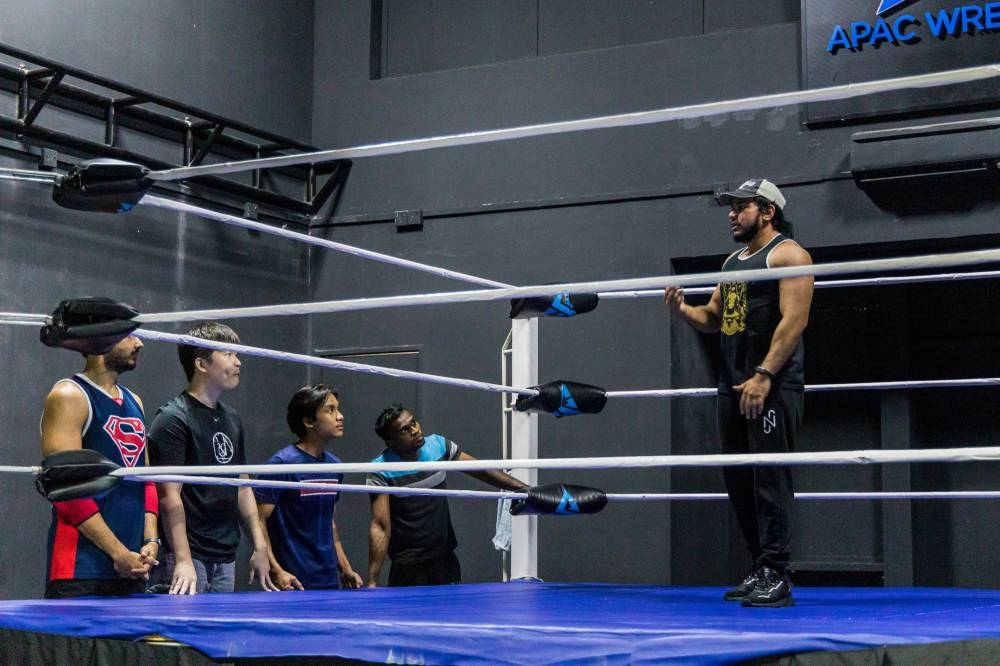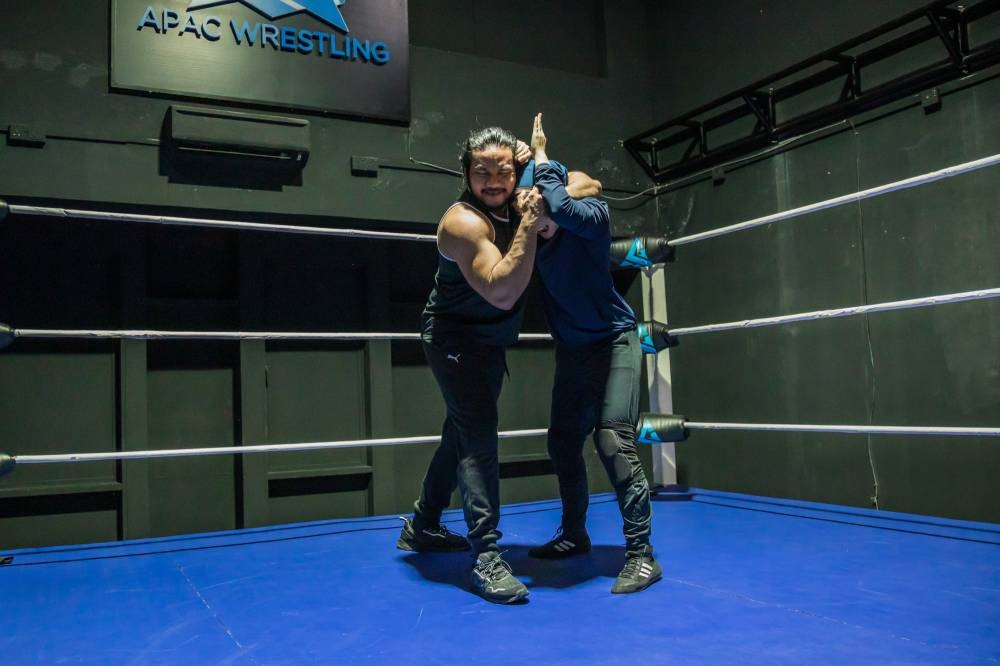KUALA LUMPUR, August 5 — Growing up, Ayez Shaukat-Fonseka Farid would avidly watch anything that had to do with the world of professional wrestling.
His go-to shows were the ones on WWE (or WWF as it was known at the time), especially to watch the Undertaker, who remains his favourite wrestler.
“I have always wanted to be a professional wrestler. When I first started training, I used to do with my siblings” he said.
He is finally a pro wrestler; he is first South-east Asian pro-wrestler to have made a winning debut at the Texas-based show, Reality of Wrestling (ROW)) and also coaches others at local wrestling academy, Apac Wrestling, that he founded.
Shaukat initially put his wrestling dreams aside to complete in degree in Medical Laboratory Technology. In 2014, Shaukat decided to follow his dreams to be a pro wrestler, having won a TV3 contest the year before which gave him a chance to meet WWE Superstar, Booker T.
Booker was the one who advised him to start his own wrestling academy in Malaysia as there was none back then.
Shaukat then opened the first pro-wrestling academy in Malaysia known as Malaysia Pro Wrestling (MYPWA) with only four students.
“In total, there was five of us and considering that pro wrestling had not been introduced yet in Malaysia at that time, people were laughing at us when we came with the idea,” he said.
“We were serious about it, but people weren’t taking us seriously at that time.
“They were taunting us like, ‘why are these guys trying to copy WWE’ ‘Malaysians don’t even wrestle’.”
They kept at it until 2016 and made their first live showcase at a wrestling expo organised by Kelab Peminat Gusti Malaysia where they impressed the public.
Although MYPWA got more members, Shaukat parted ways with his partner and opened Apac Wrestling.
"I have a very high passion for performing. I enjoy making people feel a certain way. I enjoy being able to evoke emotions or try to fish out emotions. Make them react a certain way," he said.
“I think it’s a challenge, as a performer, to do that. I think I have a knack for it, and I do believe I’m good at it.
“That’s probably what these WWE legends like Booker T and Tom Prichard sees in me.”
Wrestling is a performance sport
In an interview with Malay Mail at the home base of Apac Wrestling in Kota Damansara, Shaukat said pro-wrestling was a performance sport that relied on perfectly coordinated moves and crowd interaction.
It is one of the most popular forms of entertainment in the world.
“It’s the second most subscribed and watched channel on YouTube, they have the most subscribers on their TV networks.
“And there’s about 40 to 50 million fans on their Facebook page. Just by those stats alone, tells how big professional wrestling is,” Shaukat said.
The training syllabus at his academy is developed by Shaukat and legendary pro-wrestling superstar, Tom Prichard.
Prichard, who has trained international pro-wrestlers such as Dwayne ‘The Rock’ Johnson and Kurt Angle as well as Randy Orton, has also played an important role in Shaukat’s pro-wrestling career as Prichard is his mentor and advisor.
“In the US, if you want to train in wrestling, you’ll need a good pedigree. Good pedigree here means a syllabus from former wrestling superstars.
“For me, my syllabus is Tom Prichard and in order to train with someone with a pedigree, in the US it will cost you around RM15,000 for a six-month course.
“It’s almost the same as if you’re registering for a course at any university,” he said, adding that the monthly fee at Apac is just RM250 monthly.

Shaukat who’s currently coaching around 20 students in Apac said even though they needed students to stay afloat, it was important for those who wanted to join to have a strong desire and determination.
Amongst his students includes the world’s first Hijab-wearing wrestler, Nor ‘Phoenix’ Diana.
“You need to put in a lot before you eventually get something out of it. Not to mention training time and injuries. I have been injured many times before.
“There’s a lot of cost in becoming a pro-wrestler and the returns are not so big here in Malaysia. Not yet.
“So, one of the first parts of our training is making them understand this. There are some who backed out once they found out,” he said.
He added that most of the time, a lot of new students would also back out just after a few weeks due to the intensive training.
“This has been an ongoing pattern since before. People would come and go all the time.
“Those who are left, these are the ones who are really passionate. These are the ones who want to wrestle,” Shaukat said.
He added that it was also important for students to be on a level that’s coachable as wrestling was considered a ‘deep art’ and all the steps must be calculated in advance.
Psychology part of training
Apart from physical training, Shaukat also trains his students in the art of psychology as part of their performance training as psychology plays an important role in any pro-wrestling match as they need it to connect with the audiences.
He said audiences knew that it was a performance and the challenge for them was to blur the lines between what’s real and what’s not.
“It happens, fans go to the show knowing all of it was a performance but sometimes in a match, when someone gets thrown in the ring, they would go like, ‘is he okay, is he okay’, you made them feel the suspense.
“At the same time, they can also connect to the ‘good guy’ and ‘bad guy’ persona. So that’s the psychology in pro wrestling,” he said.

Aside from wrestling classes, Apac Wrestling also organises live wrestling matches at their dojo aside from sharing wrestling contents on their social media.
Shaukat is also hoping to find bigger venues as well as investors as he’s confident that pro-wrestling has the potential to become a multi-million industry in Malaysia in the next decade.






















